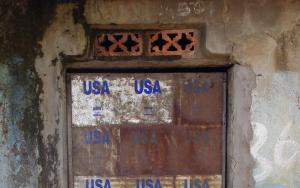You are here
- Home
- History and development: Practicing the past in the pursuit of “progress”
History and development: Practicing the past in the pursuit of “progress”
3 April 2019

This year, The Open University will host the Development Studies Association Conference, 19 - 21 June 2019. As we prepare for the event, we have invited key speakers to share details of the panels they will be holding. Today, we hear from Dr Charlotte Cross, Lecturer in International Development at The Open University and John Giblin, Keeper of World Cultures at National Museums Scotland.
The session History and development: Practicing the past in the pursuit of “progress” at DSA 2019 will tackle converging issues of heritage and development by bringing together academics and practitioners in both fields. Since the 1990s, the importance of culturally informed approaches to international development has been recognised. More recently, this recognition has been articulated as a need to engage with ideas of heritage as an ostensibly past-looking practice on which current and future development may be more appropriately built. Heritage is broadly defined as ‘the use of the past in the present’, implicitly referring to a deliberate invocation of ideas about the past that can be useful for the creation of subjective ‘better’ futures.
The importance of the role of protecting cultural and natural heritage in achieving development is enshrined in the Sustainable Development Goals, and in the UK heritage approaches to development are promoted through government-supported research opportunities such as the Global Challenges Research Fund (GCRF). In parallel, international heritage organisations, most notably UNESCO, have explicitly sought to align heritage practices with developmental agendas, while heritage researchers continue to identify heritage as being relevant for development. Examples include economic development through heritage tourism or the ‘revival’ of traditional – supposedly more sustainable – production practices, or, in socio-political development, via heritage as a foundation for community cohesion, well-being and education. These trends are particularly pronounced in post-conflict and conflict-affected contexts where, in addition to the already cited aims, heritage is invoked to heal the problematic past through memory work and in the generation of new unifying pre-conflict to conflict narratives. Indeed, in these circumstances heritage is seen both to need healing whilst also being called into action to do this healing.
However, it is rare that scholars and practitioners working in the fields of heritage and development come together to explore each other's differing agendas, challenges and potentials. As a result, they risk talking past each other from their different intellectual positions. Our session at the DSA Conference therefore aims to “open up development” through conversation with scholars of critical heritage studies, museum practitioners and historians. The papers to be presented in the session interrogate the diverse ways in which ideas about and practices associated with the past might inform development policy and practice, and in turn how narratives of development inform diverse uses of the past.
After we’ve introduced the session we look forward to being joined by:
- Ioanna Katapidi and Mike Robinson (University of Birmingham), who will address shifting contexts of policy and practice in the relations between sustainable development and UNESCO World Heritage;
- Mark Lamont (Open University), who will present a case study of an ongoing GCRF-funded project to make the maritime cultural landscape in Kenya more visible;
- Rosalie Hans (University of Nottingham), who will explore why the museum is viewed as a vehicle for economic, social and cultural benefits and propose alternative concepts;
- Adebo Nelson Abiti (University of Western Cape) and Lizzi Milligan (University of Bath) who, based on research in Uganda, will consider the learning about peace that takes place in heritage work and how this may be contextually evaluated;
- Lennon Mhishi (University of Liverpool), who will explore the possibilities of utilising arts- and humanities-based creative strategies in tackling contemporary slavery in sub-Saharan Africa, including mobilising memory and heritage for anti-slavery and development work;
- Morgan Ndlovu (University of South Africa), who will address the role of public and private heritage in development in South Africa and the potential to decolonise heritage ownership;
- Lotte Hughes, who will discuss how notions of cultural heritage intertwine with “development” in the social space of Alternative Rites of Passage, an invented ritual popular in anti-FGM/C campaigns in East Africa;
- Justin Williams (University of Birmingham), who will present ongoing research into a large rural development project implemented by a German NGO in Ethiopia 1992-2007, and outline the contribution that historical methods can make towards a greater understanding of development projects and their consequences;
- Kemist Shumba (University of KwaZulu-Natal), who will use Habermas' structure-agency theory to explore the effectiveness of Shona-Karanga traditional game and play song and concepts in promoting health and well-being in resource-constrained settings in Zimbabwe;
- Camila dos Santos (Pontifical Catholic University of Rio de Janeiro (PUC-Rio)), Marta Fernández (PUC-Rio) and Maira Siman (PUC-Rio), who will approach Brazilian South-South cooperation narratives in Africa as part of a politics of identity that helps redefine the place Brazil can occupy in modernity; and
- Smita Yadav (University of Sussex), who will use archival and museum studies to connect heritages of social change in India, thereby addressing the relation between religious-based populism and growing economic growth in India.
Share this page:
Contact us
To find out more about our work, or to discuss a potential project, please contact:
International Development Research Office
Faculty of Arts and Social Sciences
The Open University
Walton Hall
Milton Keynes
MK7 6AA
United Kingdom
T: +44 (0)1908 858502
E: international-development-research@open.ac.uk
.jpg)